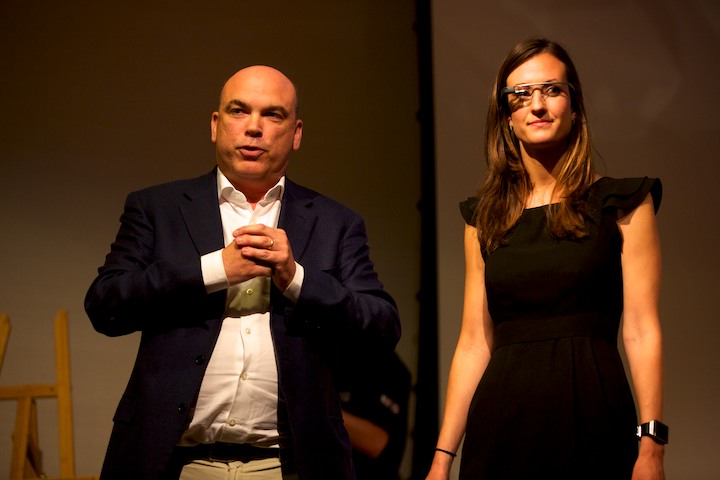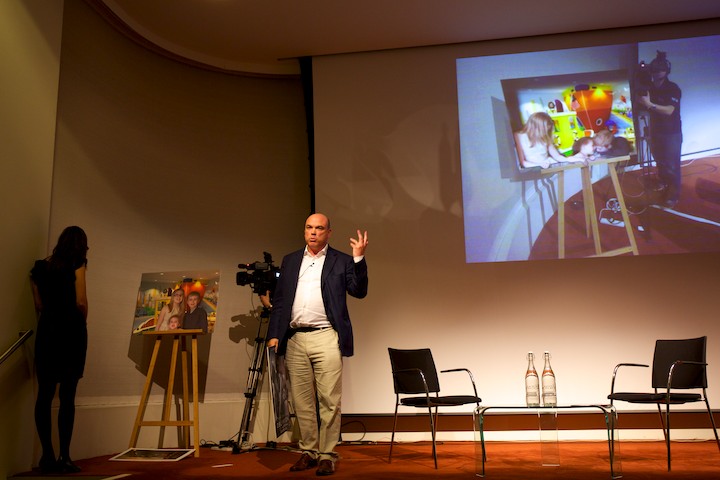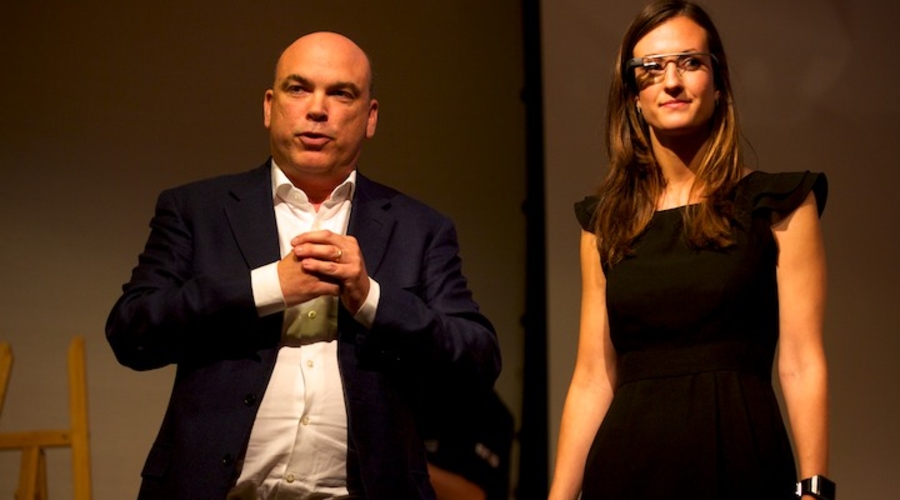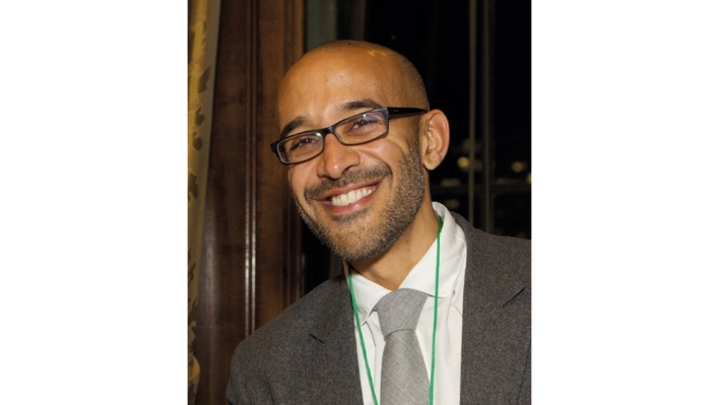Michael Lynch says machine intelligence will reinvent TV - assuming we survive the blistering speed that technology is advancing, learns Steve Clarke
Prediction may be very difficult, particularly about the future – but put technology entrepreneur Dr Mike Lynch on stage at the Royal Society and you are guaranteed a mind-stretching performance.
The Cambridge-educated scientist, described as Britain’s answer to Bill Gates (Lynch’s wealth is estimated to be in the order of £500m) provided a typically stimulating address.
His hour-long lecture managed to name check: a pioneer of nuclear physics; an obscure 18th-Century English clergyman, who, he said, is transforming software; Shakespeare; and even EastEnders, in what was the RTS’s first partnership with the IET.
At the heart of Lynch’s talk was one very simple, if unpalatable idea: the difficulty human beings have in coming to terms with uncertainty sparked by the explosive pace of technological change.
Lynch highlighted the veteran Harvard biologist EO Wilson’s belief that Swe have the emotions of the Palaeolithic, the institutions of the medieval and the technology of the godsT.
He added: SThe emotions of the Palaeolithic means we actually still have love, hate, fear, greed, jealousy and anxiety, just as you would find in human art, from Shakespeare to EastEnders.T
However, there is a critical malfunction: SWhat we are seeing in the world is the effect of these tectonic plates moving at different speeds, and they start to rub up against one another where they can’t adapt to the changes.T
Lynch advised his listeners to welcome technological change despite what he acknowledged is its terrifying speed.
Developments at technology companies make uncertainty a fact of life.
Not that it has ever been any different, said the founder of UK software giant Autonomy. Famously, he lives in a Georgian pile in rural Suffolk where, superficially, very little seems to have changed in the past 200 years.
SThe one thing I hope you take away with you tonight is that we have to embrace uncertainty,T stressed Lynch. SYou may be a little bit scared of it but, actually, the determinism that we thought we had before was an illusion.T
He had taken the title of his lecture (SPrediction is very difficult, particularly about the futureT) from a quote normally attributed to the Nobel prize-winning physicist Niels Bohr – although some claim Mark Twain was responsible for coining the wisecrack.
Lynch reminded his audience that Bohr was crucial to the development of quantum mechanics. Without Bohr’s ideas, he claimed, there would be no mobile devices, let alone television.
SThe one thing I hope you take away with you tonight is that we have to embrace uncertaintyT
The first thing about predictions is that they nearly always prophesy doom. They also have a Sfundamental tendency to overestimate the change in the short term and underestimate it in the long termT.
The 2000 dotcom boom is one example. SMost of the predictions came true, it just took a little bit longer,T Lynch recalled. SNow is the period of greatest change, because we are hitting some pretty fundamental singularities in the changes that are happening.T
He added: SThe most important influence on predicting technological change is history – because technological change always relies on a combination of technology and people.T
Near Lynch’s home in Suffolk are 11th-Century church towers; but, alongside the Romanesque architecture, home workers have access to high-speed broadband.
SIf you have a talented software programmer sitting in a Suffolk village, they can be a 100 times as productive as the median software programmer…
SThe ability to get information flow to and from the human brain has been going up exponentially.T
In the 21st Century the upside is that a creative software producer or the inventor of a hot new TV format can monetise their IP globally.
 Dr Mike Lynch talks through a demonstration of Google Glass (Credit: Paul Hampartsoumian)
Dr Mike Lynch talks through a demonstration of Google Glass (Credit: Paul Hampartsoumian)  The view of the Google Glass is projected onto the screen (Credit: Paul Hampartsoumian)
The view of the Google Glass is projected onto the screen (Credit: Paul Hampartsoumian)
Lynch turned to the impact of technology during the euro crisis and the 2008 financial meltdown.
One of its consequences has been Svolatility in the system, because political institutions cannot keep up with the speed of the trading systemT.
Nowadays, legal institutions cannot stay on top of the terabytes of data that modern companies generate.
And yet the human need to communicate remains. Facebook was created, argued Lynch, when a lot of young people from all over the world who did not know one another found themselves working in Silicon Valley. Thus social networking was born.
SIt is important to use the interaction of technology to find opportunity,T suggested Lunch. SBut it is getting more difficult due to the complexity of the modern world and the interconnections that go across nation states.T
He added: SToday the financial system moves so fast that no one can see it in totality… We’ve got a system that is completely out of control and it’s getting faster.
SFor those of you from the IET, it’s a classic, non-linear, multi-path feedback system where no one has actually thought about stability.
SFor those of you from the RTS, it’s just crazy.T
With few controls to ensure stability, volatility is set to become commonplace: SWe find ourselves slightly in a pact with the devil, where the only solution – because humans aren’t fast enough – is to turn back to the technology.T
Lynch wondered whether we are prepared to trust the financial system to even faster computers.
With smart-phone computing power doubling every 12 months, storage capacity growing exponentially and always-on connectivity a reality, a long-heralded achievement is finally taking shape. SMachine intelligence,T said Lynch, Shas been won inch by inch and it’s been a really hard slog...
SSpeech recognition has been slowly developing since the 1970s… We’re finally getting to the point where it’s starting to become very useful and very powerful. This is going to change everything…T
SIf computers are monitoring pic- tures produced by CCTV cameras and they can understand what they are
seeing, Sthe whole world changes… It also opens up all sorts of creative possibilities.T
He added: SOnce they can do that, they can all be connected up and bring together very large amounts of data.T
This has implications for content creators and broadcasters, who to date have defied the Cassandras: far from facing extinction, linear TV is in rude health.
SThe reality is that, while I don’t think television will die – in the same way that radio hasn’t died – I do think there are new creative forms coming along,T said Lynch. SThey will allow creativity to be expressed in very interesting ways.T
To show what he was getting at, Lynch was joined on stage by an assistant. She demonstrated the potential of wearable smart devices in the form of Google Glass and a Samsung watch.
But first there was a caveat from Lynch: SI warn you that what I am going to show you is the equivalent of looking at a TV set in the 1940s. It’s going to be fuzzy and clunky, but one thing we can be absolutely sure about is that it is going to get a lot better quickly…
SIf is for you [TV practitioners] to start to think about the creativity that you can put behind this.T
SSpeech recognition has been slowly developing since the 1970s… We’re finally getting to the point where it’s starting to become very useful and very powerful. This is going to change everything…T
The audience saw a family portrait suddenly burst into life in vivid 3D via Google Glass. Lynch’s assistant then used her Glass to interact with a poster advertising a Tom Cruise film.
Reviews of the movie were displayed in a fraction of a second and in less time than it takes to dial a phone number she was able to buy tickets to see the film.
Most impressive of all was Lynch’s use of an iPhone to create a small but perfectly formed 3D digital dinosaur, place it on a table and interact with the creature.
He emphasised that artificial intelligence means devices can immediately comprehend what they SseeT, rather than relying on search engines to provide a simulacrum of intelligence.
SThere is a completely different way of using information when these things become intelligent,T said Lynch.
Moreover: SJust through movement a phone camera can work out a 3D model of the world around it… So not only can you create a 3D object, but you can put that into a 3D world and interact with it completely automatically…
SImagine a new concept of TV where it is 3D in whatever context...T and creators can visually insert Snon-existent digital things into the real world, where they can interact perfectlyT as if they were real. SThe possibilities of that are really quite phenomenal.T
It was hard to disagree. Where TV and film-makers eventually take this technology is anyone’s guess.
But existing regulatory structures look, well, medieval by comparison.
Dr Michael Lynch OBE FREng, technology entrepreneur and founder of Invoke Capital, gave the RTS/IET Joint Public Lecture at London’s Royal Society on 13 May. The evening was chaired by Tim Davie, CEO of BBC Worldwide and BBC Director, Global.
Privacy is gone. Get over it
Lynch believes we are seeing the end of privacy – and, perhaps, hypocrisy as well: ‘The short thought on privacy is that it’s gone, so get over it [laughter]. You might not like it.’
He continued: ‘If you take a teenager and offer them something like the chance to win concert tickets, they will tell you vast amounts about what they are doing.
‘They don’t worry about privacy in the same way. It’s a cultural difference. The ability of the machines of intelligence to pick together all the different bits of info means that privacy is going to be a different thing in the future.
‘I get hate mail when I say that sort of thing. I am not saying it is a good thing or a bad thing.
‘The important thing to understand is, it’s going to change a lot of things.
‘One of the things that human beings have is hypocrisy. We like to say we do one thing; actually, we do another.
‘The height of hypocrisy was Victorian London, when one in six houses was reputedly a brothel, but you had the greatest flowering of the family being idealised in literature and art.
‘In the modern world, it’s going to be harder to keep the two separate.’
Question & answer session
Q What is your biggest fear at the moment?
A I think there are two major issues… The first one is stability in the financial system. There’s so many vested interests that don’t understand what’s going on. Although there are some voices now – people such as Andy Haldane at the Bank of England – that kind of get it, this it is not being dealt with fast enough.
There will be another shock at some point. We need to be ready for that.
The second is… [former Royal Society President] Martin Rees wrote a book called Our Final Century, which suggested there’s a Moore’s law of terrorism.
In the 1890s if you wanted to cause a lot of trouble you had to mass a huge army on the border, which took weeks and everybody saw it coming.
Technology has now got to the point where if you want to change world policy you can crash two airliners into the World Trade Center… That cost about $200,000 and required about 100 people.
As technology moves on, you’re going to be able to do some pretty bad things with three people.
Q We’re frightened because we think artificial intelligence will replace us. Is that fair?
A Technology creates its own set of problems, such as cyber security… The information overload problem… I think machine intelligence will get to the point where it gets better and better at filtering it for you.
The danger of that is you [might]lose serendipity, which is a very important part of how newspapers and some scheduling on the BBC works, where it used to do wonderful things such as putting something rather clever on after EastEnders…
I am more worried about who drives the agenda…
Most days we spend too much time replying to our emails, which is completely wrong...
It is very important to take back control of the agenda from the technology.
Q Britain has been a fantastically creative and inventive place. Where do we stand on the world stage today?
A The fascinating thing about the UK is that the science base and the engineering base are phenomenal. Our top universities are as good as anywhere in the world.
The difficulty is that, generally, we haven’t converted that in recent years into economic impact in the way we should have. It’s getting a lot better.
There are a series of structural reasons for that, which largely are getting fixed… The Government is trying very hard.
The sad fact is, if you go to Silicon Valley and you’re feeling a bit lonely on Saturday night, you can fill the bar with Brits – and they’re all heads of engineering. That’s got to change…
I do think there is a role for the Government in the AstraZeneca [takeover bid that Pfizer withdrew from shortly after this lecture].
What you’ve got there is amazing science and suddenly it’s [at risk of] disappearing. UK taxpayers created that science base by funding universities and research councils. The Government should not be backward in making it impossible for Pfizer to strip that IP.
Pfizer should legally agree that it is not going to move the IP offshore. It should also have to agree up front about the R&D spend in the UK…
Americans are not backward in doing this themselves. We need to say, SLook, we have a great asset here, we’re very happy for you to come and buy it, but you’ve got to do it on these terms.T
Q Google bought British neuroscience company DeepMind for £240m last year. How is the Government going to keep [science], particularly neuroscience, in the UK – or is it better off in the hands of the Big Five US tech companies?
A In an ideal world, if that company was as good as Google says it is, it would have been wonderful if it had had the finance to grow in the UK and become a very large company here.
We have a lot of good start-ups [in the UK]… The trouble is, the UK capital markets don’t work well for tech businesses. There is one technology company in the FTSE 100…
The Government and the London Stock Exchange need to work very closely together so that we can list those companies in the UK…
My career in the UK has been about starting at the beginning as a start-up and knocking down the barriers.
Bayes’ Theorem is the single most important idea driving the information revolution
Those familiar with Lynch’s work will know that he made his name (and fortune) inventing software that enables computers to search and understand unstructured data.
Much of his inspiration came from an obscure, 18th-Century Presbyterian minister and mathematician called Thomas Bayes, whose theories about probability have been taken up by the software industry.
‘For those of you in television, you ought to make a programme about this guy,’ advised Lynch. ‘He is going to be to the next century what the physicists were to the last century.’
Lynch said: ‘Bayes’ Theorem turns out the single most important idea driving the information revolution and machine intelligence.
‘It acknowledges that you can have objective science, but when it comes to recognising something or understanding that it’s subjective as you experience it, the science has been very good at dealing with the objective but it hasn’t bridged the subjective. Bayes found that bridge 250 years ago.’







